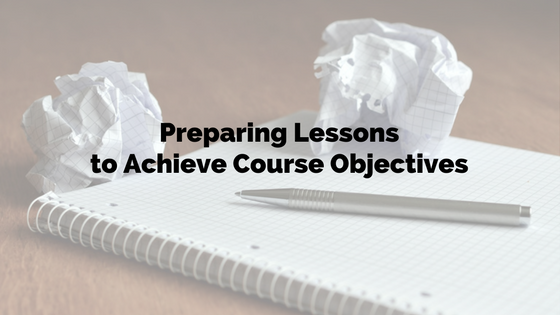
The class plan and the lesson plan, while distinct, are not mutually exclusive; a well-structured class plan creates the structure for your lesson plans for the semester. The class plan should consist of: (1) a class description, (2) goals for the course, (3) assessable goals for each general goal, (4) learning activities for each class, (5) formative assessments measuring each goal, and (6) summative assessments measure the general goals for the course (for more information on developing a class plan, refer to APL’s “Adjunct Teaching: 5 Steps to Prepare for Your First Semester.” To some degree, the lesson plan can be thought of as a micro course plan with faster assessments and feedback for your students.
Similar to your course plan, the lesson plan will be guided by your objectives and learning outcomes; clearly defined course goals are essential for clear lesson goals. You want to be sure to emphasize what you want your students to learn in each lesson, which can be accomplished by outlining learning objectives at the beginning of lecture before the start of class. These objectives will be important for your own agenda, which should guide the activities for the day and the time anticipated for achieving these objectives. While it is necessary to have high expectations about what you want to cover in the class period, it is unlikely you will reach all topics. Prior to class, rank order your priorities for the lesson; remember: it is better to reach fewer objectives more thoroughly than more objectives in a rush. Additionally, it can be helpful to outline your objectives in a way that emphasizes “student behavioral objectives.” Rather than stating, “I will teach ___,” rephrase your goals, for example, as: “The student will be able to list five qualities that distinguish between developed nations and what are termed Third World nations and explain what is meant by Third World” (Successful Teaching WordPress, 2013). Restructuring lesson objectives in this way can help guide you towards more specific outcome goals.
It is necessary to plan your lesson with the appropriate expectations for what your students may know or be capable of comprehending. While your passion for teaching may be derived from the nuances of academia, it is unlikely your students will be driven by the same intellectual curiosities. It is also necessary to provide several different explanations of the same material to allow students of different learning styles to comprehend the topics. In order to meet these challenges, do not hesitate to structure your beginning lessons with conceptual basics. “It may seem counterintuitive, but it’s much easier to ratchet up than down. You’ll not do any long-term damage if you’ve initially aimed too low” (Inside HigherEd, 2009). Reflect upon your pace and continually ask yourself: What examples will best explain this concept? What information is necessary to understand this concept?
Finally, be sure to schedule time for checking for understanding and conclude the lesson. While it may be tempting to run the lesson until the very end, allow yourself at least five minutes at the end of class to engage your students. Before class starts, generate questions that predict some possible difficulties in the lesson’s topic and prepare a formative assessment for that lesson’s objectives. Ask yourself: What is the best assessment method for this particular lesson? Is it a simple question-answer format? A quiz? Anything that forces your students to reflect on their time spent on the lesson will ensure that you can appropriately gauge your students’ understanding. At the end of class, preview the expectations for your next class period for what will be covered in the next class.
As mentioned previously, the lesson plan should be a complement to your overall course plan and course objectives. Reiterating your goals at the beginning and the end of the class period guides your lesson structure and allows your students to prepare appropriately to engage with your lessons.

